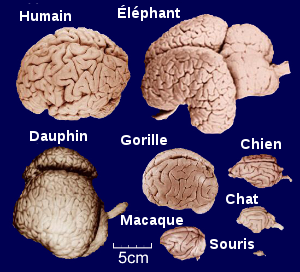It always surprises me that some people believe that some races of people are inherently more intelligent than others. For example, two comments on an article I just read:
"There is absolutely nothing hard about determining the traits for intelligence. The problem is, as is well known, that intelligence is not distributed equally among various racial groups. Thus it has become politically incorrect to even discuss it. Those that conduct good scientific work are frequently labelled racists, particularly by pseudoscientists."
"Research into intelligence, genetics, and race is the third rail of science. Those researchers risk never getting funded again, ostracizing and outrage by the less thoughtful members of the scientific community, and may even fired from their university - tenure or no tenure. The implications are just too horrifying."
I'm not even sure where to start with this. First, when we think of "race," we are usually thinking of differences in skin color. There are also differences among different groups such as nose width, lip thickness, hair color and curliness, and forehead slant. For a racist, these are enough differences to say who is who, but in reality, many other differences exist. Length of nose, angle at nose bridge, shape of nostril opening, protrusion of nose, and roundness vs. pointiness at the tip of the nose. Obviously, I've only mentioned nose traits, and there are many inheritable nose traits. I think most parts of the body, similarly, have multiple possible genetic variations. So why does skin color play the major role in differentiating races, while most of these other traits play no role at all? Really, considering "race" differences in terms of genes is a misnomer. A white person and a black person may be genetically more similar to each other than either of them is to another person. Even to another person that, in terms of skin color, may be easily placed within the black or white category. Skin color is the most easily identifiable variable, but genetically, it makes up a very tiny part of the genetic code, about the same as the genetic differences between a pointy or bulbous nose. So why do we look for differences between those of different skin colors instead of by other variables? I personally think that those that do research on the variable of skin color do it because they think there is a difference, and they want to find it and show it to the world.
There have been studies that supposedly show a difference in the intelligence of the average white person and the average black person. There have also been studies that have shown that children of low scorers tend to score lower, and children of high scorers tend to score higher. These studies seem to show that intelligence can be passed on over many generations in the "race" studies and over a single generation in the high scorer parents and children studies.
As far as the high scoring parents and children studies, it seems apparent to me that the way children are raised is a confounding factor. If you were to switch the "smart" parents' and the "dumb" parents' babies at birth, and the parents had no idea they were raising someone else's child, would the child of the "smart" parents score high or low? I put money on scoring high. This does exclude known genetic mutations that are heritable and cause developmental delay. If the kid is born without defects, I bet the kid raised by high scoring parents scores higher than the one that was raised by low scoring parents. Too bad the study would never be done because it's unethical. You could look at adopted kids, but you'd have to verify biological and adopted parents' scores. I'm not sure if it's been done. I doubt it.
As far as race differences, I want to start out with some extreme analogies. Albert Einstein takes the IQ test. But woops, he takes it in Chinese. He fails it. Is he stupid? No.
A refugee from a small tribe of wandering hunter/gatherers that doesn't know how to read takes the IQ test. He fails it. Is he stupid? No.
A person from culture B takes an IQ test created by culture C, and does more poorly on it than a person from culture C. Is he less intelligent? No.
Maybe the IQ test made by the hunter/gatherer tribe might include questions about what plants have edible roots, what times of the year certain animals are easier to hunt, or what kind of terrain certain fruits are found in. Maybe the ability to make a certain tool is highly prized. You and I fail this intelligence test miserably.
These differences in culture show up in tests. Even in our straight math tests. Our culture values math skills. Our culture values its definition of intelligence. Knowing the y=mx+b and being able to apply it doesn't mean a person is intelligent. It means that a person learned it when it was taught to them in school. They wanted a good grade, wanted to look good for the teacher or parents, thought it might be useful later on in life, were accustomed to paying attention when a teacher wanted their attention, thought not learning it would cause too many problems with parents, teachers, or school later on, etc. There are very few people that are unable to learn the equation or how to apply it. For most it's not a question of intelligence. Some are never exposed to it (and who would figure it out on their own? At least one person, who taught others, right?) Some forgot the equation, its application, or didn't learn when it was taught because they had more important things going on in their lives at the time. None of these things involves intelligence.
What really annoys me about intelligence tests is that they don't measure intelligence. They measure knowledge. With y=mx+b, we know it or we don't. Not because we can come up with it on our own if we're smart, but because we either learned it when it was taught or we didn't. One intelligence test item is taking shapes of varying sizes and colors and making them into another shape, like a box. You either know a box shape or you don't. You either understand that this pointless exercise is important to "prove" your intelligence or you don't. You either know that the shapes can't overlap each other or you don't. You either know that the colors are meaningless in terms of the activity and can be ignored or you don't. You either know that you're expected to try multiple combinations of placements until arriving at the correct combination or you don't. You either know that your are supposed to use all the shapes or you don't. You either know that you're supposed to pretend that the triangle with the corner torn off from overuse is still a regular triangle or you don't.
If you've never seen or heard of this activity before, you'll probably be pretty slow, if you complete it within the given time limits. If you watch someone else do it, or if you've done it before, or if you're familiar with these types of activities, you'll probably finish quickly. If you do it once, and then the second time, you'll probably be a lot faster. Did you suddenly get more intelligent? No, you're knowledge of the activity increased. It doesn't measure intelligence.
At the end of the day, we come to the question, what is intelligence? For me, it's a question of raw cognitive power. It's not something that should change over time or with experience. A test that measures intelligence should give a similar score to a person, even if they've taken it before. I believe that intelligence exists, and that there are differences between people, but I think it is very hard to measure. Measuring what people know is so much easier.
IQ tests as measures of knowledge instead of intelligence is indicated also by the fact that people keep getting "smarter" on average. Most IQ tests are supposed to give an average score of 100. 68% of everyone should get a score between 85 and 115. 95% of everyone should get a score between 70 and 130. But over the years, kids keep getting "smarter," such that the average score of kids at a given age rises, and the new average is (I think) coming up on 115. So they make the test a bit harder. Kids aren't getting smarter (even though some people called it a fast evolution of intelligence), it's just that educational practices are more effecting at providing knowledge, and kids are more prepared for it.
In some families, the parents will put emphasis on learning all the useless stuff we have to learn in schools. I'm not saying it's all useless. I'm sure everything gets used by someone. Some parents are saying, "you don't really need to learn this, so don't worry about it." Others are saying "Learn this, because you have to know it to go to college." Others are saying "Learn that, but what do you think about why the economy is fluctuating so much?" Anyway... parents are saying lots of things, and their views have a huge effect on what their kids will do.
So the fact that some studies have shown that white people score better than black people doesn't really mean that white people are more intelligent. It shows, in my opinion, that white people more closely follow the 'culture' of the test, and put more emphasis on the knowledge that is tested. Does this mean that they are smarter? No. Does it mean that they are more prepared for the rigours of gainful employment? No. Not unless you have a job that involves taking shapes that can be placed together to make a square... and making a square from those shapes. Even in questions like some of the basic formulas, I bet 99% of us don't use y=mx+b at all in our daily lives. Unfortunately, the difference in assimilating to the culture of the test does make a difference... because it means different scores on more than just the IQ test. It means different grades, and different attitudes about school, and different percentages of college admissions and graduation, and then different salaries, and different circumstances when raising the next generation of kids.
There are different scores by so called race. But they aren't due to differences in intelligence. When a person from culture B takes a test made by people of culture C, the person won't do as well as a person of culture C.
 Image via Wikipedia
Image via Wikipedia Image via Wikipedia
Image via Wikipedia Image via Wikipedia
Image via Wikipedia Image by doug88888 via Flickr
Image by doug88888 via Flickr Image via Wikipedia
Image via Wikipedia Image via Wikipedia
Image via Wikipedia